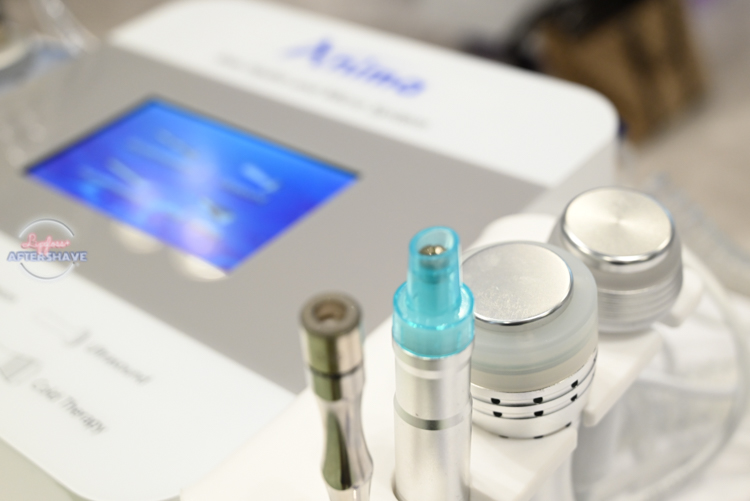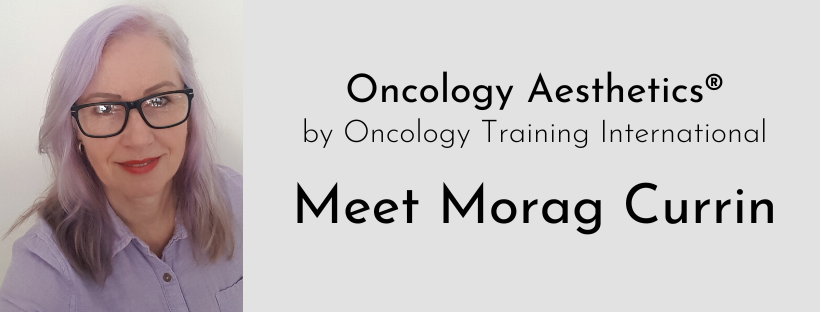Possible Sensitive Skin Side Effects of 5 Cancer Treatments
by Morag Currin
Sensitive skin side effects of 5 cancer treatments.
Performing a facial to a client undergoing cancer treatment can be done for numerous reasons – relaxation, appearance recovery, symptom relief or mental wellness. The following guidelines relate to the different drug therapies and how we can support the skin during facial services.
1 Full Dose Chemotherapy
Chemotherapy agents are usually dosed based on a patient’s height and weight, however, some cancers such as breast, prostate, and colorectal do not respond nearly as consistently to full dose (or maximum tolerated dose) chemotherapy, and side effects can be significant.
While it is tempting to use the most aggressive protocol to eliminate cancer quickly, the ‘more is better’ approach is being challenged. With full dose chemotherapy, there is a large window of time between the administration of the initial treatment and the subsequent treatment.
Typically, patients will receive treatment once every 1-3 weeks, depending on the chemotherapeutic agent(s) used, the type of cancer, and the stage of cancer. With this method, side effects frequently occur, including immune system suppression, nausea, vomiting, diarrhea, and fatigue. Administering full-dose chemotherapy more often than this would likely cause even more terrible side effects.
During that window of time between chemotherapy treatments, however, you give cancer cells that survived the treatment the opportunity to build resistance to the drug. We have learned that most tumors contain a proportion of cancer cells that are sensitive to treatments such as chemotherapy, while the remaining cancer cells are resistant to it.

DermaJEM
Spa Equipment For Sale
Trust DermaJEM for all of your spa facial and body devices. Hydrodermabrasion, Microdermabrasion, RF Microneedling, Ultrasound, Oxygen Infusion, Cold Therapy, IPL, Laser Hair Removal, Cavitation and so much more! All devices backed by a 30 month warranty!
Sensitive Skin Side Effects to Consider During a Facial
1. sensitive skin that can also appear flushed – the skin needs non-fragranced gentle, soothing product. This can include cryomed gels, a gel or sheet mask or cool wet compress.
2. photosensitivity – the skin needs sun protection product with a physical barrier from zinc oxide and clothing. Just because the client was able to tan without burning or sensitivity prior to administration of chemotherapy, does not mean the skin will respond the same way as before.
2 Low Dose Chemotherapy
Lower dosing typically uses between 10-30% of the full dose, and there are several distinct advantages of giving smaller doses more often. Low doses of anticancer drugs are given on a continuous or frequent, regular schedule (such as daily or weekly), usually over a long time.
Another advantage of lower doses of chemotherapy is an anti-angiogenic effect, meaning that blood supply to the cancer is decreased. This approach has also been found to greatly reduce toxicity.
Read More Oncology Aesthetics®
Morag Currin is a monthly featured guest blogger. She has an entire library of content on Oncology Aesthetics® here at Lipgloss + Aftershave.
Watch Webisode of L+A Now “Preview of Oncology Aesthetics®”
Watch The Episode On The L+A App!
Download on the App Store or Google Play
Sensitive Skin Side Effects to Consider During a Facial
1. Because the dosage used each time is less the side effects to the skin are greatly mitigated if not non-existent, and the damage to healthy cells is also greatly reduced.
3 Targeted Therapy
Epidermal growth factor receptors are primarily expressed in basal keratinocytes, the outer layers of hair follicles, eccrine sweat and pilosebaceous glands and periungual tissues. Inhibiting these EGF pathways in the skin results in arresting cell growth and migration, apoptosis, chemokine expression, and abnormal maturation and differentiation. The cellular cascade results in an inflammatory response in the skin.
Sensitive Skin Side Effects to Consider During a Facial
1. acneiform rash. This is a skin condition that causes small, raised, acne-like bumps to form, usually on the face, scalp, chest, and upper back. The bumps on the affected skin are usually red and filled with pus and may crust over. They may also become painful, tender, and itchy – the skin needs hydrating, soothing product. This can include cryomed gels, gel or a sheet mask or cool wet compress.
2. xerosis (dryness) – the skin needs emollients to keep the skin from drying out and the skin needs sun protection product with a physical barrier from zinc oxide and clothing. If the skin starts to flake, then products containing lactic acid, salicylic acid, or urea-containing topicals is needed. Dry skin can also develop fissures and become extremely itchy (pruritis). Menthol-based moisturizers can be used for itching, and this can include peppermint hydrosol. Fragrance free product will be best for dry skin and the client must always remain hydrated to avoid further deterioration of the skin.
4 Hormone Therapy
SERMS = selective estrogen receptor modulators are drugs prescribed for hormone sensitive cancers. People taking these drugs report a sudden onset of skin aging several months after menopausal symptoms begin. The menopause causes hypoestrogenism, accelerating age-related deterioration, which results in thinner skin, an increase in number and depth of wrinkles, increased skin dryness, and decreased skin firmness and elasticity.
Hot flashes occur when decreased estrogen levels cause the body’s thermostat (hypothalamus) to become more sensitive to slight changes in body temperature. When the hypothalamus thinks the body is too warm, it starts a chain of events — a hot flash — to cool the body down.
Sensitive Skin Side Effects to Consider During a Facial
1. During a hot flash, blood vessels in the upper body expand, allowing more blood flow to the area. This increased blood flow can cause blotchy patches on the skin, or flushing.
2. Offer your client a portable fan or spray the face, neck and décolleté with a cool toner/spritz when symptoms occur. An alternative could be application of a cryomed hydrogel, or gel mask.
3. Encourage your client to breathe deeply during a hot flash.
4. Offer the client some cold water as this helps provide a cooling effect on the body but also keeps the client hydrated. Add lemon and other citrus fruits (blood orange, mandarin, limes, etc., into the water as they are full of bioactive compounds that help the heart, blood vessels and hot flashes. An alternative would be a flavoured tea consisting of rooibos, black cohosh and raspberry leaf.
5. The client may need to remove any layers of bed linens during a hot flash.
5 Immunotherapy
Immunotherapy, also called biologic therapy uses the body’s natural defenses to fight cancer by improving the immune system’s ability to attack cancer cells. The skin-related reactions to immune checkpoint inhibitors are relatively uncommon but may include:
Rash, skin that feels itchy, burning, or tight, blisters (bullous dermatosis), peeling or cracked skin, reddening or other discolored patches of skin, purpura (patches of purple spots), painful skin and patchy areas of hair loss.
Sensitive Skin Side Effects to Consider During a Facial
1. Any client undergoing immunotherapy drug therapy needs to protect their skin with SPF 30 and/or to wear protective clothing.
2. Avoid any drying products such as soaps, products with drying ingredients such as volatile alcohols, sulfates, etc. Fragrance free products are best to avoid any unnecessary reaction to fragrance. Avoid ‘drying’ products used for acne as they will aggravate any area of sensitivity.
3. Be aware the client may be using medicated corticosteroids on affected areas of skin, as they can present with side effects. For itching that does not involve a rash, an anti-itch cream can be applied to the area for relief. Apply a cold, wet cloth or ice pack to the skin that itches. Do this for about five to 10 minutes or until the itch subsides. Apply cooling agents, such as menthol or calamine.
NOTE: The client needs to address any ongoing rash or skin issues with their medical team.


